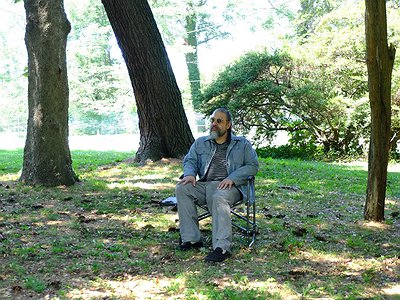Name: Joshua Abrams
Nationality: American
Occupation: Composer, improviser, bassist, multi-instrumentalist
Current release: Together with drummer Chad Taylor, Joshua Abrams forms the duo Mind Maintenance, on which they play guimbri and mbira. Their self-titled album is out now on Drag City.
If you enjoyed this interview with Joshua Abrams, visit his website for biographical notes and deeper information on his scores. His ensemble Natural Information Society has a separate website as well.
Where does the impulse to create something come from for you? What role do often-quoted sources of inspiration like dreams, other forms of art, personal relationships, politics etc play?
Honing that impulse can be a means of navigating the world. It can function as augury & engine.
For you to get started, do there need to be concrete ideas – or what some have called a 'visualisation' of the finished work? What does the balance between planning and chance look like for you?
There can be a visualization of the sound. It can also manifest as a visualization of an aspect of a sound or a voice within a greater collective sound. Sound is sound, ideas are not sound.
That said dreaming on a sound can be a valuable part of the process. There are many other possibilities between planning & chance. Decisions always happen in a moment, even if they are a long time brewing. As Mike Tyson famously said “Everyone has a plan until they get punched in the mouth.”
Is there a preparation phase for your process?
Chad and I have been playing music together for 25 years. That’s the fundamental preparation for the record. We’ve been thinking about making a duo record for at least 10 years. Perhaps the preparation was making the occasion to rehearse and record.
Do you have certain rituals to get you into the right mindset for creating? What role do certain foods or stimulants like coffee, lighting, scents, exercise or reading poetry play?
Everything affects everything.
What do you start with? How difficult is that first line of text, the first note?
Our process is one of continuance so it mostly about stepping into the flow. Setting up a situation where we can both hear our sound & each other’s sound & the nuances that we both find at any given moment is key.
Many writers have claimed that as soon as they enter into the process, certain aspects of the narrative are out of their hands. Do you like to keep strict control over the process or is there a sense of following things where they lead you?
The goal is to keep the flow going.
I think we are conduits for the music. That said, our decisions have an enormous effect on every aspect of the sounds we make.
Often, while writing, new ideas and alternative roads will open themselves up, pulling and pushing the creator in a different direction. Does this happen to you, too?
Yes. Embrace the new path & maintain focus or stay on the original path & maintain focus.
There are many descriptions of the creative state. How would you describe it for you personally? Is there an element of spirituality to what you do?
Most states of being are creative states. Sometimes they are more fruitful than others.
Especially in the digital age, the writing and production process tends towards the infinite. What marks the end of the process?
When it feels done. I think that awareness can grow with experience. Diminishing returns are no joke.
Once a piece is finished, how important is it for you to let it lie and evaluate it later on?
It can be helpful to come at something with fresh ears but it is possible to wait too long and lose momentum. Momentum is valuable and ideally not squandered.
What's your take on the role and importance of production, including mixing and mastering for you personally? How involved do you get in this?
Very important and very involved.
After finishing a piece or album and releasing something into the world, there can be a sense of emptiness. Can you relate to this – and how do you return to the state of creativity after experiencing it?
Usually there is a wait between finishing an album and its actual release. By the time it has reached the world a lot of time has passed and with that time, many experiences different states of being. That said if I’m feeling empty, I might try to embrace that feeling or keep stepping.
Creativity can reach many different corners of our lives. Do you personally feel as though writing a piece of music is inherently different from something like making a great cup of coffee? What do you express through music that you couldn't or wouldn't in more 'mundane' tasks?
I make a solid cup of coffee and while I take pleasure in that process I would say it is different than making music.
There is an important aspect of finding and learning in my process that isn’t present to the same degree in my coffee making. Sure I might experiment a little, but for me the music is a far more vast territory.
To loosely paraphrase my friend Martin Arnold, (who could be paraphrasing someone else for all I know) if music expresses anything it is more akin to expression of milk. This sentiment makes some sense to me.

